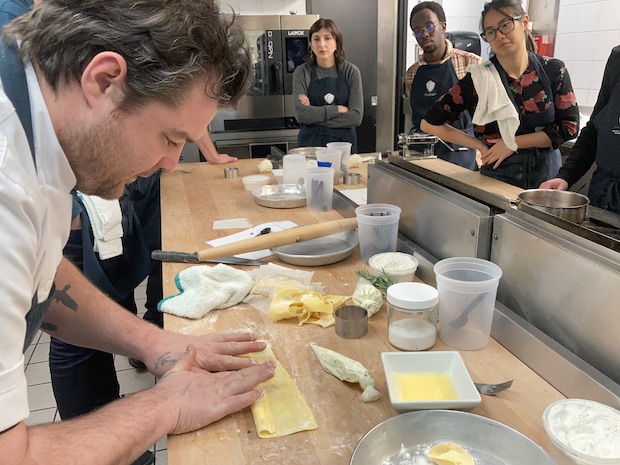I took a three-hour cooking class that taught me how to make fresh pasta and puttanesca sauce—something I had never even tasted before. We also made vanilla panna cotta for dessert.
Those are three things I never would have tried at home. I still make that pasta sauce, and some of the techniques I learned while making it come in handy when I’m making other dishes.
Was the cooking class worth it? Well, the truth is that my employer paid for it as part of a team-building exercise. However, it would have cost me $100-$125 if I had paid for it myself. I was entertained for three hours and enjoyed a terrific meal with good company at the end of it.
I’ve spent more money watching a bad hockey team for three hours.
When you consider that I learned new recipes, new techniques, and gained new knowledge that I now carry into my kitchen every day, the cooking class was well worth it. I would gladly have paid for it myself.
But if you’re weighing the value of a cooking class for yourself, I’ll give you some things to think about.
Know What You Want Out of a Cooking Class
The best way to get value out of a cooking class is to make sure it matches your goals. There are as many different kinds of cooking classes as there are cooks. An avid home cook who wants to raise their game won’t get much out of a class designed for people who are new to cooking. And there’s little point in teaching a beginner how to make a vanilla emulsion when all they want is to become comfortable making breakfast in the morning.
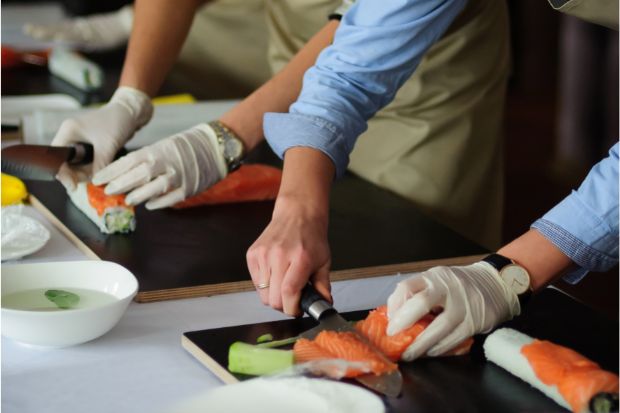
So first, think about what you want to get out of it. And don’t be afraid to ask questions of the people who are offering the class.
General Cooking Classes vs. Specific Skills
Cooking classes can vary widely in the material they cover. If you’re looking to learn general cooking skills and techniques, that’s one kind of class. If you’re looking to learn specific skills, that’s another.
The class I took was specifically to learn how to make an Italian meal, and make fresh pasta.
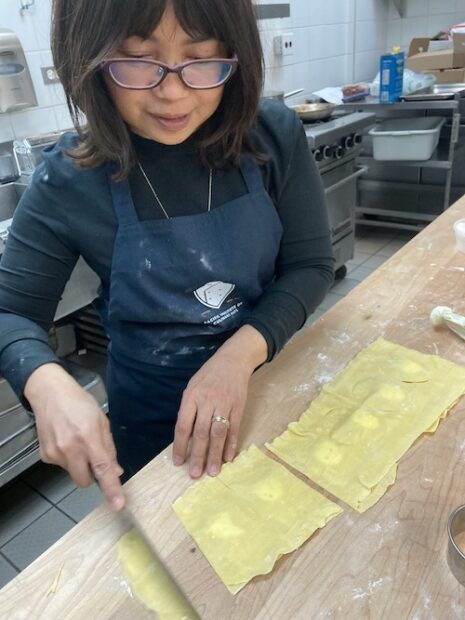
Maybe you want to learn how to make pastry. That’s a different class.
Some classes teach knife skills. You’ll learn how to keep your chef’s knife sharp and how to use it to its full potential. The skills you learn there will stick with you the rest of your life, no matter what kind of cuisine you’re making.
Hands-on Training is Key
If you are taking a class in person, I recommend taking one that will give you hands-on experience and allow you to get busy preparing some food.
Some classes are more like demonstrations, where a chef stands up front and makes something in front of everyone, explaining things as she goes. You can learn a little bit there, but not as much as you’ll learn by first watching the chef, and then preparing the meal yourself while the chef wanders the room and gives you pointers.
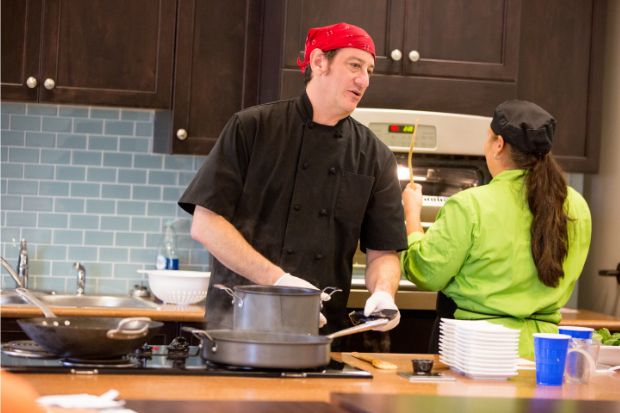
These classes are a must for anyone who is a visual or tactile learner, as opposed to somebody who learns best from watching videos or reading books.
Can You Learn How to Cook by Consuming Media?
YouTube has its advantages. It’s convenient. It’s free. And it seems like there’s a video for pretty much everything.
What YouTube cannot do—and neither can books or podcasts—is answer your spontaneous questions, observe your technique and give you immediate feedback. Nor does it provide a fully equipped kitchen for you to practice what you’re learning.
I find YouTube quite helpful for demonstrating specific techniques, like how to chop an onion or make a particular sauce.
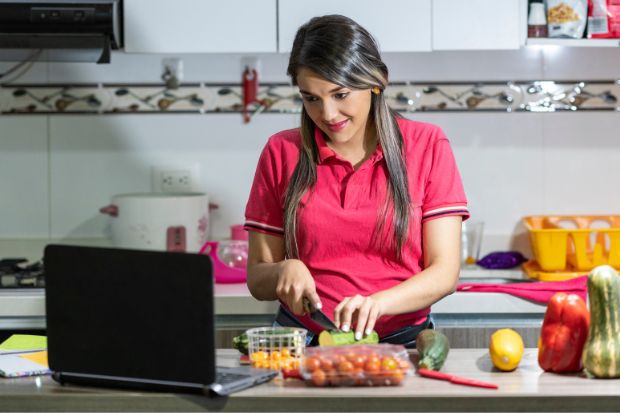
It can also be great for step-by-step instructions on specific recipes. But that’s not learning how to cook—that’s learning how to make a meal. There’s a difference. Ideally, an in-person cooking class will teach you principles and techniques that you can apply in any number of scenarios, including creating your own recipes.
Even cookbooks fall short in some respects. They’re generally written for people who know how to cook. They’ll throw out instructions like, “Fold the egg whites into the batter,” with no thought for whether the reader knows how to properly fold, or even knows what folding is.
Go to a cooking class, and you’re going to learn the right way to fold.
Choosing a cooking class
Cooking classes tend to be either short, one-off classes for amateurs, or certification-length courses for professionals. Occasionally you’ll find a regular night class that runs for several weeks or months.
You need to know where your skills are at, and choose whichever is most appropriate.
One-time Classes
One-time cooking classes are typically offered through a community college or a culinary school. You go for a morning, an afternoon or an evening—usually for about three hours—and learn how to make one main dish and perhaps a side or dessert using certain techniques.
These classes are for people who are already somewhat into cooking, but want to learn about something specific.
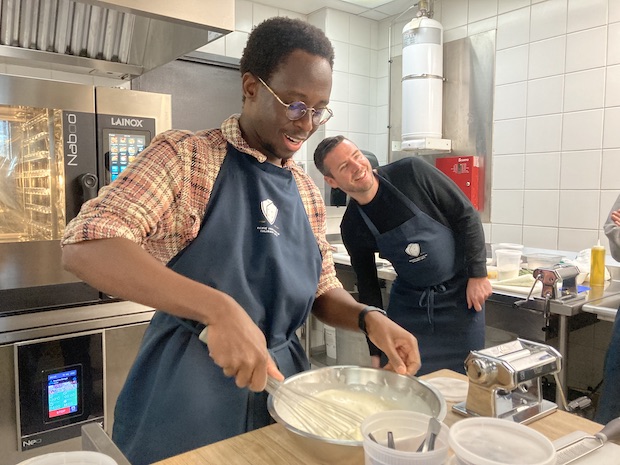
Weekly Classes
Weekly cooking classes are most likely to be offered by a community college. Each individual session takes a similar format to a one-time class, but you might get seven or eight of them over the course of a couple of months. This allows you the opportunity to try different cuisines, techniques and cooking methods in each session.
Many of these classes are designed for people quite new to cooking. They may start with the basics in early sessions and then build skills from there.
Professional and Full-Time Courses
Professional-oriented cooking courses are basically like going to cooking school. They are not for amateurs, but for people who have working kitchen experience and want to build a career out of their cooking skills.
If you’re a beginner, try to find a fundamentals course through your community college. If you’re a decent home chef looking to elevate, a one-off class can teach you some new, specific skills. If you’re looking to make a living cooking, a full-time professional course is for you.
Call ahead
Whichever class you’re considering, contact them ahead of time and ask them some questions. If you describe your current skill level and your goals, they’ll be able to tell you whether their cooking class is for you, and what you can expect to learn.
What Do You Learn in Cooking Class?
The best cooking classes, in my opinion, provide you with the basic building blocks that allow you to create in your kitchen.
Many of them start with mise en place.
Mise en place
Real chefs are fanatical about mise en place. People seldom bother with it in their own kitchens.
The French term means “put in place” and refers to the habit of gathering everything you need to prepare your dish and having it ready ahead of time.
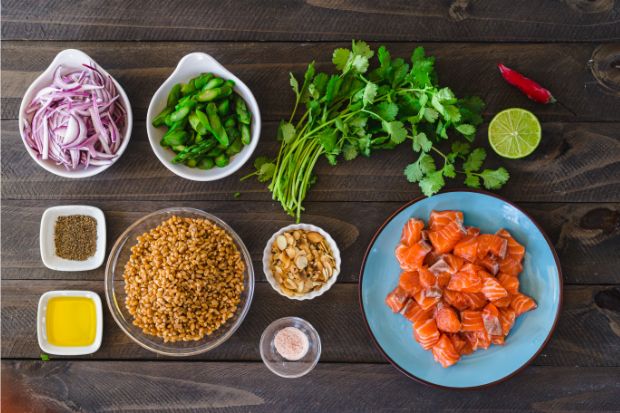
“Before you even turn on the stove, before any chicken hits the pan for your favorite stir-fry, the ingredients should be peeled, cut and measured,” says Joann Pan of Taste of Home.
Cooking classes teach you the importance of preparing everything in advance so you can access it quickly once the heat is on.
Foundational skills
A good cooking class teaches you something about the craft of cooking and gives you tools you can use over and over again.
For example, did you know there are only five ‘mother sauces’ from which almost every other sauce is derived? They are:
- Béchamel
- Velouté
- Tomato sauce
- Espagnole (brown sauce)
- Hollandaise
A cooking class can teach you this sort of thing. You learn how to prepare the sauces (or at least one of them), and that gives you a platform or all sorts of future experimentation.
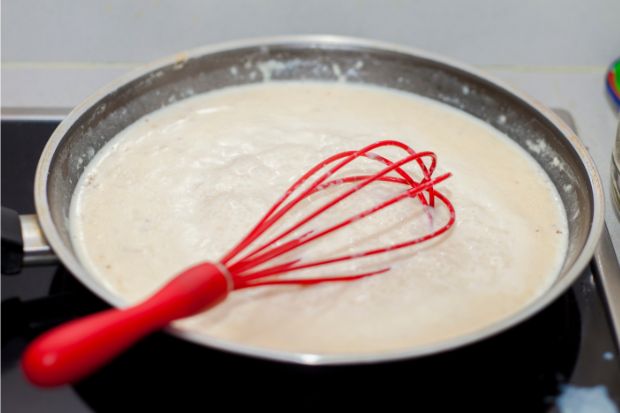
A cooking class may also teach you about:
- ingredients, what they do and how to use them in different situations
- specific cooking methods or techniques
- efficient ways to cut or mix
Once you know these things and have practised them, you shouldn’t need step-by-step instructions for a lot of dishes. Most recipes are just variations on a few tried-and-true preparations and techniques. Knowing these can make you independent of cookbooks and recipes.
The Importance of Tasting
Almost every cooking class will emphasize the importance of tasting as you go. Recipe-followers don’t typically do this, but an experienced cook will tell you it’s the most important thing in cooking, as it is the only sure way to get salt and seasoning right.
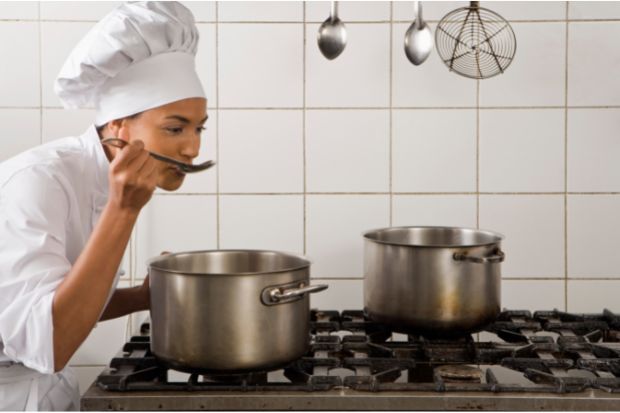
Benefits of Taking Cooking Classes
Live, in-person cooking classes have several benefits that other methods of learning don’t offer. These can make them worth the money, assuming the cost is reasonable.
It’s Social
Private lessons are great, but you seldom take cooking classes alone. More likely you’ll have a class size of 6-15 people who are equally into food.
In fact, for many people the social aspect is the main attraction. Learning how to cook something is just a bonus.
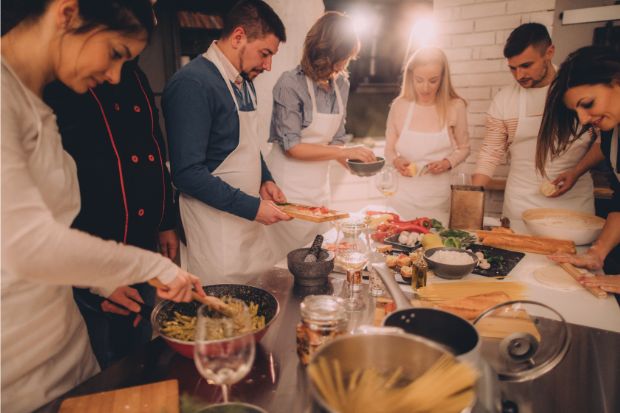
You Get to Use Professional Equipment
When I took my class, I had never used a pasta rolling machine. Now I have. I’m not saying I’ll get one for my home, but some people in that class might.
I also got to cook on a professional stove with huge gas burners, using excellent skillets. Everything in the kitchen was top-notch.
In some ways it can be difficult to go from that luxury back to your own kitchen and equipment. But it can also open your eyes to what a huge difference quality equipment can make. Maybe you’ve never used a proper, sharp chef’s knife before. After taking a cooking class, you might realize how life-changing it can be, and decide it’s worth the investment for yourself.
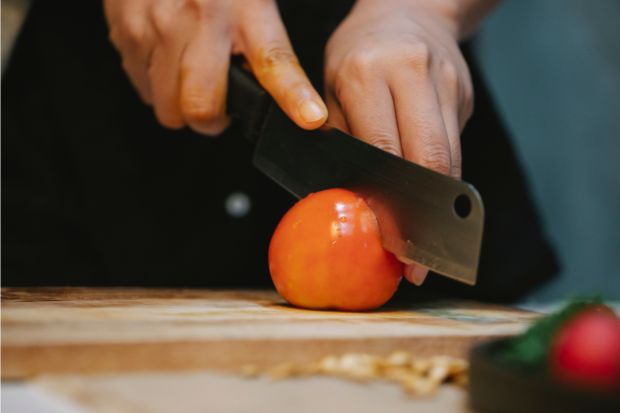
Hands-on Practice
If you choose the right class, you’ll get to practice what you’ve learned immediately. There’s nothing like beginning to drill in good habits right after you’ve learned them.
Personal instruction
In most classes, the chef/instructor will observe as you get to work and provide helpful recommendations or corrections to your technique as you go. This kind of feedback is invaluable and you can’t get it anywhere else.
Learning New Cuisines
Some regional cuisines use ingredients, techniques and equipment that are unique to the region and its cooking. A cooking class can be a great way to familiarize yourself with cuisines that are mostly foreign to you. If you love Thai food but have only ever eaten it at a restaurant because you’re not familiar with the techniques, a cooking class can be a great way to change that.
Keep in mind, though, that a class focused on regional cuisines will not go particularly deep, even if it’s a weekly class. I came across an insightful comment from a participant in a forum run by the Society for Culinary Arts & Letters:
“The problem with most regional cooking classes is that, if you have a single day, about the most you can practically do is babysit a bunch of people through cooking three recipes, max. That’s not a very broad or deep exposure to a culture. For the cost of a day-long class, you could instead buy the seminal cookbooks of that cuisine, eat several times at the best ethnic restaurant to dial your palate in, and then enough ingredients to cook a dozen dishes from your cookbook. For the price of a week-long class, you could afford to fly to that region for a week and eat whatever you want.”
Food for thought, if you’ll pardon the pun.
What Really Makes a Cooking Class Worth It
If I had to put my finger on one thing that makes cooking classes worth the money, it’s this:
You don’t know what you don’t know.
I cook a lot. I’ve been doing it since I was a child. And yet, my cooking class experience showed me how a real chef dices a shallot and I realized I’ve been doing it wrong for decades. I now dice shallots more efficiently.
What’s more, I had never really thought about using shallots instead of onions in pasta sauce before. Now I do it all the time.
If you have a passion for cooking and learn even one new thing in cooking class that you’ll use for the rest of your culinary life, I’d say that’s money well spent.
